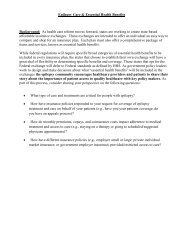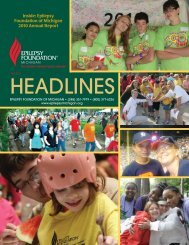Legal Rights of Children with Epilepsy in School & Child Care
Legal Rights of Children with Epilepsy in School & Child Care
Legal Rights of Children with Epilepsy in School & Child Care
Create successful ePaper yourself
Turn your PDF publications into a flip-book with our unique Google optimized e-Paper software.
The Special Education Process for <strong><strong>Child</strong>ren</strong> <strong>with</strong> <strong>Epilepsy</strong>: The Individuals <strong>with</strong> Disabilities Education Act (IDEA)<br />
4.19Q: What are some <strong>of</strong> the typical related services that students <strong>with</strong> epilepsy<br />
might require?<br />
A: Related services are services that enable a student <strong>with</strong> disabilities to benefit<br />
from his or her special education. For a student whose only disability is epilepsy,<br />
who needs special education because <strong>of</strong> the adverse effect the epilepsy has on<br />
his or her educational progress, school health services might be the only needed<br />
related services. Or, depend<strong>in</strong>g on the student’s situation and needs, counsel<strong>in</strong>g<br />
might be an important related service to assist the student <strong>in</strong> cop<strong>in</strong>g <strong>with</strong> his or<br />
her epilepsy <strong>in</strong> the school sett<strong>in</strong>g <strong>with</strong> his or her peers.<br />
Other related services may also be needed. Parent counsel<strong>in</strong>g might be a helpful<br />
service to assist parents <strong>in</strong> meet<strong>in</strong>g their child’s needs so the student will benefit<br />
from educational services. For a student <strong>with</strong> Landau-Kleffner syndrome, for<br />
example, where speech loss is part <strong>of</strong> the syndrome, speech and language<br />
services may be an important related service. Depend<strong>in</strong>g on the needs <strong>of</strong> a<br />
student <strong>with</strong> epilepsy and on whether he or she has other disabilities,<br />
occupational or physical therapy might be educationally necessary to enable him<br />
or her to benefit from the special education he or she receives. For a student <strong>with</strong><br />
behavioral issues, the team should be asked to conduct a functional behavioral<br />
assessment and develop a behavioral <strong>in</strong>tervention plan based on positive<br />
behavior supports and <strong>in</strong>terventions to m<strong>in</strong>imize the chances <strong>of</strong> discipl<strong>in</strong>ary<br />
action aga<strong>in</strong>st the student. For a student who becomes fatigued easily or needs to<br />
sleep because <strong>of</strong> seizures or medication he or she takes to control seizures, the<br />
IEP team can <strong>in</strong>clude sleep or rest time on the IEP as a program modification or<br />
support or as part <strong>of</strong> the health services plan. For a student on a special diet for<br />
seizure control, such as the ketogenic or Atk<strong>in</strong>s diet, the IEP should reflect that<br />
the student is on that regimen for seizures; the school system is not required to<br />
provide the food but needs to implement the diet dur<strong>in</strong>g school hours and<br />
ma<strong>in</strong>ta<strong>in</strong> the <strong>in</strong>tegrity <strong>of</strong> the diet to ensure that the student rema<strong>in</strong>s safe.<br />
Ma<strong>in</strong>tenance <strong>of</strong> the diet dur<strong>in</strong>g school hours should not be viewed any<br />
differently than adm<strong>in</strong>istration <strong>of</strong> medication to a student.<br />
4.20Q: Is a child <strong>with</strong> epilepsy entitled to a one-to-one aide or to a nurse?<br />
A: A student <strong>with</strong> epilepsy is not automatically entitled to a one-to-one aide or a<br />
nurse. If a student’s <strong>in</strong>dividual needs require that he or she receives the<br />
assistance <strong>of</strong> a one-to-one aide or a nurse <strong>in</strong> order for the student to receive a<br />
free appropriate public education, the student will be entitled to the aide or nurse<br />
as an IEP–related service.<br />
In the case where the child’s doctor does not believe that an aide or nurse is<br />
necessary, it is important to remember that the issue for the IEP team to consider<br />
is whether such a staff person is necessary for the student to attend school and<br />
receive an appropriate education. Although the physician’s op<strong>in</strong>ion about<br />
whether a nurse is necessary will likely carry a great deal <strong>of</strong> weight because the<br />
45








